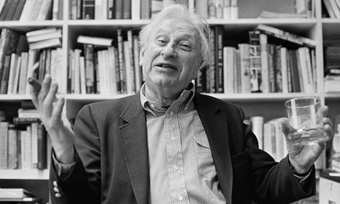Behar-Bechukotai
Permanent link27 Iyar 5772 / May 18-19, 2012

In this week’s double Torah portion, where we complete the Book of Leviticus by reading the portions of both Behar and Bechukotai, we are immediately introduced to the concept of the land resting.
"Six years you may sow your field and six years you may prune your vineyard and gather in the yield. But in the 7th year the land shall have a Sabbath of complete rest.”
Who knew the ground needed a break! It’s hard to remember sometimes that most of our ancestors were farmers, and that our major holidays (of Passover, Shavuot and Sukkot) have agricultural underpinnings.
After seven sets of seven years (49 years) there is a Jubilee year.
In the 50th year, the Jubilee year, the land rests and is returned to its original owners (with a couple of exceptions) and private debts are forgiven. I know quite a few folks who would love for the Jubilee year to be reinstated so as to extinguish their mortgages!
We stopped celebrating the Jubilee for a number of reasons. A couple of thoughts: (1) It was hard to keep count as a Diasporic people spread all over the place. (2) There was a rabbinic argument about when the 50th year technically started, thus there were conflicting opinions about when to observe it. It’s hard to have a society-wide phenomenon, where land holdings are returned to their original owners, if you don’t know when exactly that’s meant to happen.
Also – there were practical issues.
Every seventh year, we were required to let the land lay dormant, and to only eat what it naturally produced. We could not plant, sow, harvest, etc. The Torah says that God promised to provide enough food in year six to cover years six, seven and eight. If the 49th year was a seventh year, which it would be, that means that for both the 49th and 50th years, the Israelites would not have been allowed to grow food! While the Torah says that God will provide, having that kind of faith is admittedly difficult.
During the seventh year of each seven-year cycle, as well as in the 50th year, all debts were forgiven. If you were a lender, and you knew that all debt would be forgiven in the near future, why on earth would you lend anyone money, knowing you might not get it back? We see in our own economy today that having the ability to borrow money is essential for meaningful economic growth.
As you might expect, lenders were loath to lend when close to the seventh or Jubilee years, despite God’s explicit instruction to do so in the Torah (effectively making the potential lenders sinners). In response, Rabbi Hillel created a legal fiction called “Prozbul” that allowed for lenders to lend to others, even when approaching the Jubilee year, by creating a legal document that would accompany the interest-free loans (charging interest to fellow Jews is forbidden in the Torah) that stated that the loans were to be transferred to the courts, making the debt public, and thus not required to be released during a seventh year or during the Jubilee. Prozbul benefitted both borrowers and lenders – borrowers had access to cash, and lenders knew their money was safe. And yet, Rabbi Hillel created a system that explicitly went against God’s specific instructions!
In doing so, Rabbi Hillel established a meaningful tradition that has guided many rabbis in terms of how they make decisions. We look to the Torah, our texts and traditions; we look at the realities in the world around us; and we find a way to meaningfully and authentically blend the two.
But how can we find meaningful ways to blend the two in our own lives? Particularly if many of us don’t have a firm grasp of our texts and traditions?
We learn from Rabbi Shammai in Pirkei Avot, the section of the Mishnah that shares the “ethics of our ancestors,” that we as Jews are meant to set aside a regular time in our schedules for Torah study. Rabbi Hillel echoes Shammai, saying: “Do not say when I have free time I will study Torah, lest you not have free time.” Rabbi Hamnunah says in the Gemara that "[t]he first thing a person will be held accountable for on his day of Heavenly judgment is whether he fulfilled his duty of studying Torah."
While most of us aren’t really thinking about our day of Heavenly judgment, what we are thinking about is all of the work we have to get done this week, the errands we need to run, the room we’re meant to clean, the friends we want to spend time with, figuring out why the Tigers’ offense stinks, and the desire we have to read the third book of the Hunger Games and/or watch the season finale of Glee. With all of those things, how on earth are we meant to set aside time to continue our Jewish educations?
I have a secret to share with you. You may not believe it’s true, but I’m going to tell you anyway:
There is nothing more fun or more meaningful in the entire world than learning. Seriously.
The desire to learn is programmed into us as human beings, both naturally, and with some societal nudging. As babies, we take in the world around us and by trial and error learn what’s dangerous. In elementary school, we learn how to read and write. In middle school, we learn what it is to have a crush on someone. In high school, we start to really figure out who we are as people, and what we really believe about the world around us. In college we lay the foundation to achieve our professional goals. The pursuit of knowledge – and on a higher level, of truth – is our de facto motivator as humans. And wouldn’t you know it – truth is one of the ways we describe God. We end the Shema with the words “Hashem Elokechem Emet” – “The Lord your God is Truth.”
In the spirit of furthering my argument that learning in general, and Jewish learning in particular, is both fun and meaningful, I have some suggestions for topics you may like to study as you continue your Jewish education:
Did you know that there were several different ancient versions of the Torah, mostly differing by spelling, and that there are words that are traditionally read differently from the way they’re written?
Go and Learn!
Did you know that in the Torah, Moses never actually says “Let my people go!” – rather, he tries to trick Pharaoh by having him let the Israelites go on a three day trip into the desert in order to have a festival to God, with the promise that they would then return?
Go and Learn!
Did you know that in the Mishna, our legal code published around the year 200, there is a whole section about people who are “Androgynous” and don’t fit neatly into the category of “male” or “female?”
Go and Learn!
These are just a few of innumerable interesting realities begging to be studied.
Like Rabbi Hillel and his creation of Prozbul, so too do we have the ability, and I would argue, the responsibility, to meaningfully engage with our sacred texts, to be aware of the world around us and the events taking place in it, and to devote ourselves to finding ways to enhance our own lives and the lives of all we encounter by meaningfully and authentically combining the two. To do so, we need to commit to learning from our tradition and to learning about the world around us.
How do we know where to start when it comes to Jewish learning? In the words of our ancient sage Joshua ben Perachyah, also quoted in Pirkei Avot: Provide for yourself a teacher and get yourself a friend. Utilize the rabbis and teachers you’ve formed relationships with. Reach out to new rabbis and teachers. Develop meaningful relationships with them and others. Make our tradition truly your own. Never stop learning.
Tzeh Ul’mad – Go and Learn.




.jpg)



